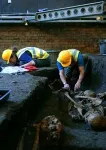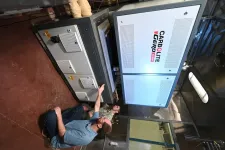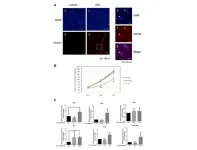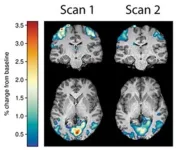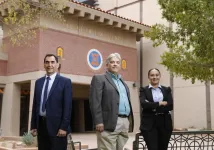(Press-News.org) A researcher from The University of Texas at Austin has received a grant from the National Oceanic and Atmospheric Administration (NOAA) to study how changing aerosol pollution could influence climate change in the United States in the coming decades.
Aerosols are tiny solid particles and liquid droplets that contribute to smog and are emitted from industrial factories, power plants and vehicle tailpipes, as well as natural sources like volcanic eruptions. These small particles can influence the Earth’s climate by reflecting or absorbing sunlight and changing the behavior of clouds.
Geeta Persad, an assistant professor at the UT Jackson School of Geosciences, is lead researcher. Persad and her team will use one of NOAA’s leading climate prediction models, SPEAR, to project how future climate hazards across the U.S. — such as floods, fires and drought — could be impacted by different aerosol emission scenarios over the coming decade.
The research is part of a larger NOAA initiative called “Climate Futures: Projections for Socially-Relevant Problems.” The initiative includes 13 research projects seeking to improve climate change projections.
Over the industrial era, aerosols from human activities have masked about half of the global warming from greenhouse gas emissions by reflecting sunlight, said Persad. But how aerosol emissions will change in the future is highly uncertain in light of air pollution efforts that seek to greatly reduce them. This has important implications for how global warming and climate change will unfold.
“In the next 20 to 30 years, [the aerosols] will either stay the same or grow slightly or disappear completely. That's a huge uncertainty in how rapidly climate change is going to accelerate,” said Persad, who is part of the Jackson School’s Department of Earth and Planetary Sciences. “What we're really trying to do here is ensure that this aerosol uncertainty is going to be characterized appropriately.”
The research team will pursue a new set of experiments in the SPEAR model, which is managed by NOAA’s Geophysical Fluid Dynamics Laboratory, to pinpoint how climate change projections in the continental United States between now and 2050 are affected by different aerosol emissions trends. The researchers are including a wide range of scenarios because it is highly uncertain how efforts to improve air quality could play out worldwide.
The new experiments with SPEAR will be part of an international project, the Regional Aerosol Model Intercomparison Project, which will involve other institutions across the world performing identical simulations. Persad and collaborators will compare the SPEAR model results with those from the other participating models to ensure that different aerosol scenarios – and their influence on the climate — are appropriately characterized.
The project is funded by a $460,397 grant from the Modeling, Analysis, Predictions, and Projections (MAPP) program at NOAA’s Climate Program Office. Persad and her team will use the simulations to investigate how different aerosol scenarios impact natural hazards like heatwaves, extreme precipitation, and fire weather across the U.S. The simulations will be run at NOAA by Persad’s collaborator and project team member David Paynter using high performance computers.
“I’m grateful to have NOAA’s partnership to help fill this critical knowledge gap in how U.S. climate risk will evolve,” said Persad
Persad said that she hopes that the new knowledge generated by the SPEAR models will help shape climate policy and planning to better account for the risks that come from changing aerosol emissions.
Dan Barrie, MAPP’s program manager, said this project has an important role to play in understanding and preparing for future climate risks.
"Dr. Persad's work is critical in evaluating our confidence in projections of climate decades into the future, as aerosols are a significant but often under-evaluated aspect of regional trends in the climate,” he said. “We are also excited that this project deepens Dr. Persad's relationship with NOAA, where she previously worked at our Geophysical Fluid Dynamics Laboratory."
END
New project investigating how aerosols could affect climate change in near future
2023-12-01
ELSE PRESS RELEASES FROM THIS DATE:
Physicians, scientists agree increased East-West travel has negative impacts on student-athletes through sleep and circadian disruption
2023-12-01
Announcements in June 2022 of possible realignments of major east-west athletic conferences raised concern among many sleep and circadian physicians and scientists across the United States. As a result of such changes, student-athletes would suffer the negative consequences of increased travel—especially with travel that that crosses time zones and induces jet lag.
Because of the concern over the demise of the Pac12, leading to more east-west trips, a group of sleep and circadian scientists and physicians have published a white paper ...
Arizona State, Idaho National Laboratory team to boost clean energy research
2023-12-01
Idaho National Laboratory (INL) and Arizona State University (ASU) have agreed to expand their joint efforts in clean energy research for the next five years. An agreement signed in October establishes a framework for both institutions to develop low-carbon processes for the energy and manufacturing sectors.
One joint project works to improve and decarbonize methods to extract critical minerals needed for renewable energy generation, energy storage and high-tech electronics. Another effort will develop solutions to electrify process heating, a major pathway to decarbonizing heavy manufacturing.
Researchers from INL and ASU have previously ...
New bottlenose dolphin sense discovered: they feel electricity
2023-12-01
Born tail first, bottlenose dolphin calves emerge equipped with two slender rows of whiskers along their beak-like snouts – much like the touch-sensitive whiskers of seals. But the whiskers fall out soon after birth, leaving the youngster with a series of dimples, known as vibrissal pits. Recently Tim Hüttner and Guido Dehnhardt, from University of Rostock, Germany, began to suspect that the dimples may be more than just a relic. Could they allow adult bottlenose dolphins to sense weak electric fields? Taking an initial close look, they realised that the remnant pits resemble ...
Genomic study sheds light on how carnivorous Asian pitcher plants acquired signature insect trap
2023-11-30
BUFFALO, N.Y. — Possessing more than two complete sets of chromosomes can be a hindrance to long-term survival of a plant lineage, yet scientists are also finding evidence it’s likely behind some evolutionary innovation.
Sudden inheritance of whole suites of extra gene copies can add redundancy to an organism's regular sets of functions, actually permitting some of those copies to evolve and express in entirely new ways.
In the case of the East Asian pitcher plant, this mutational freedom may have even fine-turned its ability to capture prey and satisfy its appetite for “meat.”
That’s just one of the findings ...
Harnessing the power of a parasite that can stop pain
2023-11-30
COLUMBUS, Ohio – For the first time, scientists have begun to figure out why the disfiguring skin lesions caused by cutaneous leishmaniasis don’t hurt.
Researchers analyzed leishmaniasis lesions on mouse skin to detect metabolic signaling pathways that differed from uninfected mice. Results suggested the parasites that cause the disease change pain perception – presumably as a way to delay treatment and promote their own survival.
“No one knows why these lesions are painless – ...
Aging modulates extracellular vesicles of epidermal keratinocytes
2023-11-30
“In this article, we describe for the first time the impact of chronological aging on EVs production by human keratinocytes.”
BUFFALO, NY- November 30, 2023 – A new research paper was published on the cover of Aging (listed by MEDLINE/PubMed as "Aging (Albany NY)" and "Aging-US" by Web of Science) Volume 15, Issue 22, entitled, “Chronological aging impacts abundance, function and microRNA content of extracellular vesicles produced by human epidermal keratinocytes.”
The disturbance of intercellular communication is one of the hallmarks of aging. In their new study, researchers ...
Center for BrainHealth publishes new model to predict improvement in brain health
2023-11-30
As part of its ongoing quest to advance better brain health and performance, new research led by Center for BrainHealth at The University of Texas at Dallas investigated neural biomarkers associated with improvements on a brain health index.
The study, “Toward Precision Brain Health: Accurate Prediction of a Cognitive Index Trajectory Using Neuroimaging Metrics,” was recently published in Cerebral Cortex
A total of 48 participants aged 21–65 completed a simple task during a functional magnetic resonance imaging (fMRI) session, then once ...
Scientists find gene therapy reduces liver cancer in animal model
2023-11-30
Researchers at UC Davis Comprehensive Cancer Center have shown that inhibiting a specific protein using gene therapy can shrink hepatocellular carcinoma (HCC) in mice. Silencing the galectin 1 (Gal1) protein, which is often over-expressed in HCC, also improved the anti-cancer immune response and increased the number of killer T cells inside tumors. The study was published in Acta Pharmaceutica Sinica B.
“We’ve long known that Gal1 is a biomarker for hepatocellular carcinoma,” said ...
Air Force awards UTEP Grant to safeguard assets in space
2023-11-30
EL PASO, Texas (Nov. 30, 2023) – Space near earth is teeming with objects, whether natural, like meteors and comets, or manmade, like satellites, spacecraft and rocket debris. But experts still need a clearer picture of the location and state of these objects, which can threaten space-based assets, such as GPS, weather-monitoring and communication satellites.
“The United States is dependent economically and militarily on space assets,” said Miguel Velez-Reyes, Ph.D., chair of the Electrical and Computer Engineering Department at The University of Texas at El Paso. “For ...
Stigmatizing content on social media affects perceptions of mental health care, new study reveals
2023-11-30
Research has shown that social media can negatively impact people's mental health. But can it affect people’s beliefs about mental health treatment?
Yes, according to researchers at Union. In one of the first studies to examine the impact of social media on people’s perceptions of mental health care, researchers discovered that viewing just a few social media posts that mock mental health treatment can have a profound impact on some people's attitudes toward treatment.
The study appears in the latest issue of the journal Social Media + Society.
For the study, 186 participants viewed 10 tweets. The gender ...

